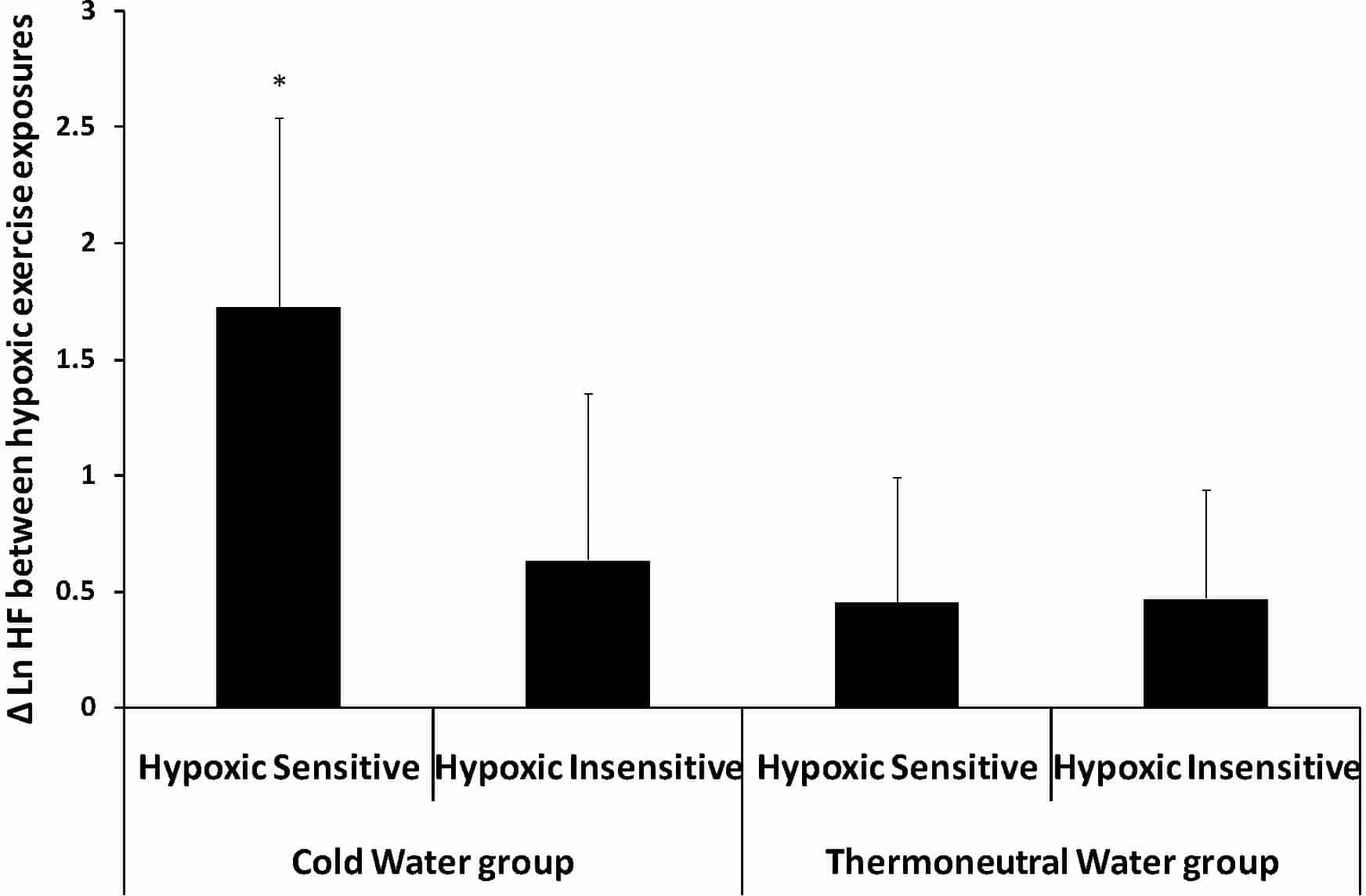Although usually investigated in isolation,environmental stressors are often combined,an example being cold and hypoxia.There has been limited research in this area,but work with rodents indicates that intermittent cold exposures may have a positive cross-adaptive effect during subsequent hypoxia (LeBlanc 1969).It was hypothesised that habituation of humans to short cold-water immersions may influence the autonomic response to acute hypoxia.Thirty-two males performed ten-minute bouts of rest and exercise (100 W) in normoxic and hypoxic conditions(FIO2 0.12).Each bout was separated by a recovery period (~20 minutes).This process was repeated after 96 hours.Venous blood samples were taken after each bout for the determination of catecholamine concentrations by HPLC.A three-lead ECG was recorded and the final five-minutes of each bout analysed for heart rate variability using Fast Fourier transforms, and displayed as log transformed data(Ln).During the 96 hour interval,participants underwent six,five-minute immersions in thermoneutral (35oC,TW group,n=16) or cold water (12oC,CW group,n=16).A preliminary hypoxic exposure was used to characterise participants as hypoxic sensitive(HS),or hypoxic insensitive(HI) using the difference in heart rate response to normoxic and hypoxic exercise.Those with the largest change were grouped as HS and the remainder HI, and allocated equally to the CW and TW groups.Values are displayed as mean(SD) with differences investigated by mixed ANOVA or Mann Whitney U tests.No between-groups differences in any variables were found during the initial bouts of rest and exercise in normoxia or hypoxia. Following cold acclimation,an increased Ln high frequency (HF) power (P<0.001),and reduced adrenaline (P<0.001) and noradrenaline response (P<0.001,Table 1) was evident for the CW group in the second hypoxic exercise test,relative to the pre-immersion test.When separated into HS and HI subgroups, Ln HF was larger in the CWHS group during the second hypoxic exercise test than for CWHI (P=0.045),TWHS (P=0.001) and TWHI groups(P=0.003,Figure 1).It is concluded that habituation to short cold-water immersions reduced the sympathetic response and elevated the parasympathetic activity during hypoxic exercise.Therefore,the hypothesis is accepted.These data indicate a positive generic autonomic cross-adaptive effect between cold and acute hypoxia in humans.
University of Manchester (2010) Proc Physiol Soc 19, C38
Oral Communications: Cross-adaptation:habituation to short cold-water immersions affects the autonomic response to acute hypoxia
H. Lunt1, J. Corbett1, M. Barwood1, M. Tipton1
1. Department of Sport and Exercise Science, University of Portsmouth, Portsmouth, United Kingdom.
View other abstracts by:
Figure 1 Mean(SD) of Ln HF change when exercising in hypoxia,by immersion group and hypoxic sensitivity * P<0.05
Table 1 Mean(SD) of catecholamine concentrations after exercise in hypoxia (FIO2 0.12), pre and post repeated cold or thermoneutral water immersions<#13>* Between exposures (P&lt;0.05), &#8224; Between groups (P&lt;0.05).
Where applicable, experiments conform with Society ethical requirements.


